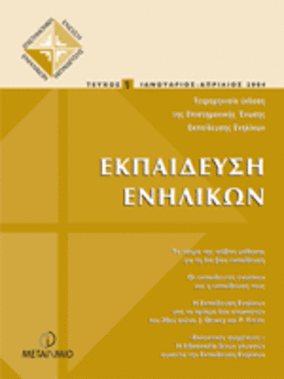Ανιχνεύοντας εκπαιδευτικές εμπειρίες ενηλίκων γυναικών σε προγράμματα εκπαίδευσης ενηλίκων : νέα δεδομένα και παλιά προβλήματα
Part of : Εκπαίδευση ενηλίκων ; Vol.30, 2013, pages 3-7
Issue:
Pages:
3-7
Parallel Title:
Tracing educational experiences of women in adult education programs : new data and old problems
Section Title:
Άρθρα - Μελέτες - Έρευνες
Abstract:
In this article we report on experiences of adult women who participated in varying types of adult education programs, after being a long time away from any educational activity. Narratives of twelve women, randomly selected were recorded in semi-structured interviews and analyzed in order to identify the difficulties they faced and the obstacles they overcame in order to successfully complete the programs attended. The women participated in our research, returning after years to educational activities by evoking their experiences confirm the negative effects of multiple conflicts between various types of responsibilities. These responsibilities have been imposed on them and have been adopted by them during their family, social and professional lives. On this ground, comments and reflections on the gender dimension of adult education are presented.
Subject:
Subject (LC):
Notes:
Περιέχει πίνακες και βιβλιογραφία
References (1):
- Εθνικό Κέντρο Πιστοποίησης Δομών Συνεχιζόμενης Κατάρτισης (Ε.ΚΕ.ΠΙΣ.). Σύστημα Παρακολούθησης καιΑξιολόγησης των Κέντρων Επαγγελματικής Κατάρτισης(ΚΕΚ).Δεύτερηφάση εφαρμογή 2003-2005,2005-2006, 2007-2009, Αθήνα: 2006, 2008, 2010.European Parliament (2007). Culture and education: Genderaspects in lifelong learning. Ανακτημένο 2/8/2012 από:http://www.cyclisis.gr/files/gender_policies_vt.pdf καιστο http://www.europarl.europa.eu/activities/expert/eStudies.do?language=EN, Brussels.Braun, V., and Clarke, V. (2006). Using thematic analysis inpsychology, Qualitative Research in Psychology, 3,77-101.Cross, K. P. (1981). Adults as learners. San Francisco: Jossey-Bass.Cumming, A. (1992). Access to literacy for language minorityadults. ERIC Digest. ERIC Document ED 350 886.Dench, S. & Regan, J. (2000). Learning in later life: Motivationand impact, DfEE Resesarch Brief No. 183. Nottingham,UK: Department for Education and EmploymentPublications. Ανακτημένο 16/06/2012 από http://www.employment-studies.co.uk/summary/summary.php?id=rr183.Fairchild, E.E. (2003). Multiple roles of adult learners, NewDirections for Student Services, 102, 11-16.Giannakopoulou, H., & Koulaouzides, G. (2008). The secondchance of the “second sex”: participation barriers forwomen in postgraduate adult distance education. Στο A.Chronaki (ed.) (2008), Mathematics, Technologies,Education. The Gender Perspective, Volos, Greece:Thessaly University Press, 103-107.Hart,D.,Long,E.,Breslauer,H.&Slosser,C.(2002).Why aren'tthey calling? Summary of results on the national study:Nonparticipation in literacy and upgrading programs.Toronto: ABC Canada.Home, A. & Hinds, C. (2000). Life situations and institutionalsupports of women university students with family andjob responsibilities, Proceedings of the 41st AdultEducation Research Conference, Vancouver, BC:University of British Columbia. Ανακτημένο 16/06/2012απόwww.edst.educ.ubc.ca/aerc/2000/2000Proceedings.pdf.Livingstone, D.W. (2002). Mapping the iceberg. NALL WorkingPaper.Toronto:OISE/UT.ERICReproduction DocumentED478 439.MacKeracher, D., Suart, Th., & Potter, J. (2006). Barriers toParticipation in Adult Learning, Ανακτημένο 16/06/2012από http://www.nald.ca/library/research/sotfr/barriers/barriers.pdf.Merriam, S.B., & Cafferella, R.S. (1999). Learning in adulthood: Acomprehensive guide (2nd ed.). San Francisco: Jossey-Bass.OECD - Organisation for Economic Cooperation andDevelopment. (2002). Thematic review of adult learning:Canada. Background Report. Paris: OECD. ERICReproduction Document ED 469 815.O’Leary, Z. (2004). The Essential Guide to Doing Research.London: SAGE.Read, N. O., Elliott, M. R., Escobar, M. D., & Slaney, R. B. (1988).The effects of marital status and motherhood on thecareer concerns of re-entry women, The CareerDevelopment Quarterly, 37, 46-55.Tett,L.(2006). Community Education: Participation risk anddesire. Στο C. Leathwood and B. Francis (Eds.) (2006),Gender and Lifelong Learning, Critical feministengagements, London: Routledge, 97-107.




